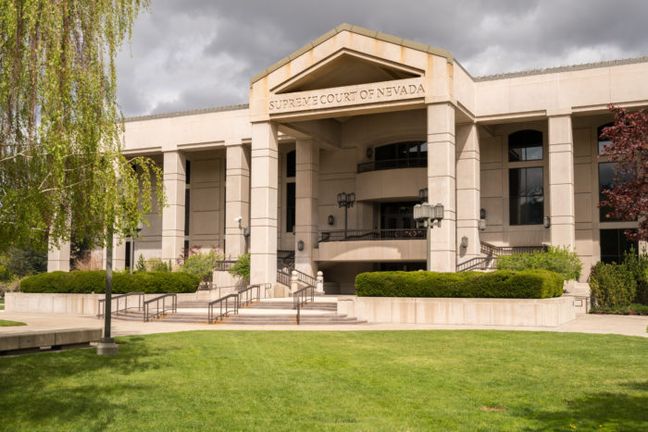In 2015, the Nevada legislature enacted Assembly Bill (A.B.) 125, which increased the time for bringing an action for construction defects from six years to ten years. See NRS 11.202(1). Also of note, NRS 11.202(2) adds language allowing a claim to be brought at any time, i.e. without any limitations period, after substantial completion for “any act of fraud in causing a deficiency in the design, planning, supervision or observation of construction or the construction of such an improvement.” See NRS 11.202. Through this statute, the legislature also retroactively shortened the statute of repose for construction defect actions. Byrne v. Sunridge Builders, 136 Nev. Adv. Op. 69, 6-7 (October 29, 2020). A statute of repose (sometimes called a nonclaim statute), like a statute of limitations, is a statute that cuts off certain legal rights if they are not acted on by a specified deadline. See FDIC v. Rhodes, 130 Nev. 893, 899 (Nev. 2014).
When the legislature retroactively shortened the statute of repose for construction defect lawsuits with the enactment of A.B. 125, it created a grace period for claimants to “commence” an action even after the statute of repose had run. Byrne, 136 Nev. Adv. Op. 69 at 6. This led to the question of what “commence” means. Some parties interpreted “commence” to mean when a party received notice of a claim under NRS 40.645 (“Chapter 40 Notice”). Other parties interpreted “commence” to mean the actual filing of a lawsuit.
Recently in Byrne v. Sunridge Builders, 136 Nev. Adv. Op. 69 (October 29, 2020), the Nevada Supreme Court (the “Court”) reviewed a lower court’s decision granting summary judgment in favor of general contractor respondent, holding claimant’s action was time-barred. In that case, respondent, along with numerous subcontractors, substantially completed building single-family homes in Henderson, Nevada. In December 2015, approximately six years and seven months after the house was built, claimant served a Chapter 40 notice. In August 2016, seven years and three months after the house was built, the claimant filed a lawsuit against the general contractor and subcontractors.
The Respondent argued summary judgment was appropriate because claimant filed her construction defect action more than six years after the home was built, and therefore claimant’s action was barred by the statute of repose. Claimant argued that by serving a Chapter 40 notice during the statutory grace period, NRS 40.695(1) tolled the statute of repose.
The Court rejected claimant’s arguments, noting the grace period was a mechanism established by the Legislature by which a claimant could save his or her claim from being time barred due to the shortened retroactive statute. Id. at 8. The Court found the claimant had until May 2015—six years after the home’s substantial completion—to file her action under the statute of repose. She did not. Further, the claimant had until February 2016—one year after the effective date of A.B. 125—to file her lawsuit within the grace period. She did not. Byrne’s lawsuit filed in August 2016 was therefore time-barred. Id. at 7-8.
The Court clarified “commence” means claimant filed a lawsuit, not merely served notice of a construction defect under NRS 40.645, within the grace period to preserve his or her action. The Court noted that in that case, by the time Byrne served an NRS Chapter 40 Notice in December 2015, the statute of repose had already expired. In other words, in December 2015, there was no statute of repose left to toll.
Additionally, the grace period itself did not constitute a new statute of repose subject to tolling. Rather, the grace period was a distinct mechanism established by the Legislature, by which a claimant could have saved his or her claim from being suddenly time barred due to the shortened, retroactive statute of repose. In order to salvage a claim under the grace period, a claimant had to commence an action. Byrne, 136 Nev. Adv. Op. 69 at 8. Because claimant filed to file her lawsuit within the grace period and the statute of repose had run, the Court concluded the claimant’s claim was time-barred.
What this means is there is no longer a question of what a claimant must do to preserve his or her claim. A claimant must file a construction defect lawsuit within the grace period, and not merely serve an NRS Chapter 40 Notice, to preserve his or her claim after the six-year statute of repose had run. Otherwise, a claimant’s action is time-barred.

 Cannabis Workers Allege Quota to Trim 4 Pounds a Day Violates the California Labor Code
Cannabis Workers Allege Quota to Trim 4 Pounds a Day Violates the California Labor Code
 The Ninth Circuit Reminds Us: Every Word Matters
The Ninth Circuit Reminds Us: Every Word Matters
 NO WAY, PRO SE! The Consequences of Abusing the Judicial System as a Pro Se Litigant in Colorado
NO WAY, PRO SE! The Consequences of Abusing the Judicial System as a Pro Se Litigant in Colorado
 Victim of Financial Mismanagement or Unlawful Retaliation? New Jersey City University Program Founder Claims School Retaliated After Reporting Alleged Sexual Harassment
Victim of Financial Mismanagement or Unlawful Retaliation? New Jersey City University Program Founder Claims School Retaliated After Reporting Alleged Sexual Harassment
 “Real Housewives” Gets a Reality Check
“Real Housewives” Gets a Reality Check
 Missing a Chapter: Insufficiency of Expert Deposition Testimony in Medical Malpractice Litigation
Missing a Chapter: Insufficiency of Expert Deposition Testimony in Medical Malpractice Litigation
 Crash Course: Why Summary Judgment Misses the Mark in Illinois Multi-Cause Limousine Crash Collision
Crash Course: Why Summary Judgment Misses the Mark in Illinois Multi-Cause Limousine Crash Collision
 Bitter Truths: Lead, Cadmium, and Defective Pleadings in California Chocolate Class Action
Bitter Truths: Lead, Cadmium, and Defective Pleadings in California Chocolate Class Action
 The Law of Unintended Consequences: Including Insurance Brokers in Litigation Strategy Communication May Waive the Attorney-Client Privilege
The Law of Unintended Consequences: Including Insurance Brokers in Litigation Strategy Communication May Waive the Attorney-Client Privilege
 Disability Benefits for Undocumented Persons in Nevada
Disability Benefits for Undocumented Persons in Nevada
 Nevada Clarifies the Factors a Court Must Consider When Determining Whether Excusable Neglect Exists
Nevada Clarifies the Factors a Court Must Consider When Determining Whether Excusable Neglect Exists
 Nevada Courts Are Opening Up; What Will That Look Like?
Nevada Courts Are Opening Up; What Will That Look Like?